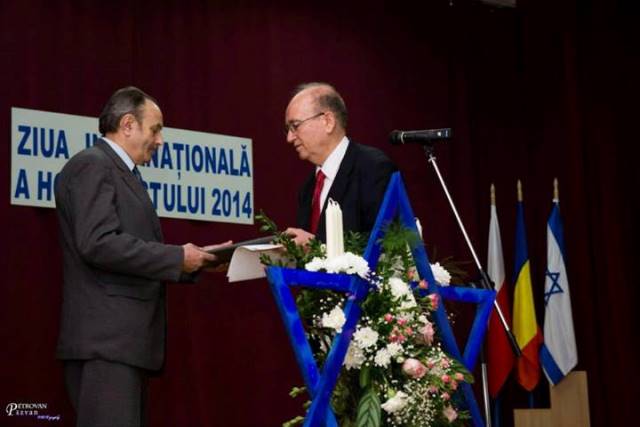The International Holocaust Remembrance Day, established for 27 January of every year, as well the pogrom in Bucharest and the deportations from Northern Transylvania were commemorated in events across Romania.
A special event marking the International Holocaust Remembrance Day and 70 years since the deportations of Jews from Northern Transylvania was organized on Sunday, 26 January 2014, in Şimleu Silvaniei, by the Şimleu Silvaniei City Hall, Local Council and Holocaust Memorial Museum in Northern Transylvania. In this event H.E. Ambassador of the State of Israel to Bucharest, Mr. Dan Ben-Eliezer, participated together with H.E. Ambassador of the Republic of Poland to Bucharest, Mr. Marek Szczygiel.
During the event, H.E. Ambassador Dan Ben-Eliezer presented a certificate of honor as Righteous among Nations issued by Yad Vashem, the Holocaust Martyrs' and Heroes' Remembrance Authority in Jerusalem, Israel, to Mr. Ervin Kapolovici, the son of Mrs. Magdalena Kopelovici (born Lehoczki), for her courageous act which saved the lives of Jews from the ghetto in Satu Mare, who were on their final march to Austria.

In his speech, H.E. Ambassador of Israel said:“Today we remember and mourn the six million Jews, out of which one and a half million were children, whose lives ended suddenly in the Second World War, as a result of the most violent form of hatred in Europe – anti-Semitism. We should not forget the Holocaust in Transylvania and other parts of Romania.
We should also remember those courageous persons who risked their life during the Holocaust for saving Jews from death sentence like Mrs. Magdalena Kopelovici did seventy years ago.
Nowadays we are aware of a revival of nationalist tendencies in various European countries, showing trends of extremism in political right wing circles, which encourage towards racism and anti-Semitism. That is why we need to work harder than ever to preserve the memory of the Holocaust from generation to generation.”
In his speech, H.E. Ambassador of Poland said:
“On Monday, 27 January 2014, a ceremony will be held for the 69th anniversary of the liberation of the German Nazi concentration and extermination camp Auschwitz. Honorary patronage over the event will be assumed by the President of the Republic of Poland, Bronisław Komorowski.
Up to the moment of the liberation of the camp, the Nazis murdered approximately 1.1 million people in Auschwitz, mostly Jews and Poles, but also Roma and people of other nationalities. Today, the world sees Auschwitz as a symbol of the Holocaust and atrocities of World War II.
The history of the Holocaust is an integral part of the history of Poland. Of the six million Holocaust victims, three million were Polish citizens. It was on the occupied territory of Poland, that German authorities located their extermination industry. The protection of memory and preservation of the memorial sites is our common responsibility”.
The pogrom in Bucharest that took place during the Legionnaires Rebellion on 21-23 January 1941 was commemorated in a series of events organized by the Federation of Jewish Communities in Romania, headed by Deputy Mr. Aurel Vainer.
Attending the events on Wednesday, 22 January, the Deputy Chief of Mission of the Embassy of the State of Israel to Bucharest, Mrs. Shelly Hagler Livne said:
“We commemorate today 73 years since the legionary pogrom in Bucharest took place, when the Jews of this city became victims without defense. They were denied the right to exist within the society and the right to live.
In Bucharest, one hundred and twenty lives were taken and hundreds of other lives were humiliated, abused and tortured only because they were Jews.
Therefore we, the State of Israel, among all the nations in world, must continue to fight against Anti-Semitism, and against all forms of racism, xenophobia and intolerance still very present in our societies.”
The commemoration of the International Holocaust Remembrance Day, exactly on 27 January, The National Institute for Studying the Holocaust in Romania "Elie Wiesel" held the exhibition "How was it possible? The Jewish Holocaust in Romania”.
Many other workshops, debates, conferences and meetings took place up to January 27 in cities across Romania to remember the tragedies of the Holocaust, and many more will continue to be organized throughout this year.
January 27 was declared the universal day of remembrance of the victims of the Holocaust by the United Nations in 2005, marking the liberation of Auschwitz-Birkenau extermination camp in 1945 and the end of one of the darkest times of human history. Additionally, a 2007 resolution condemns any denial of the Holocaust as a historical event, either full or in part.